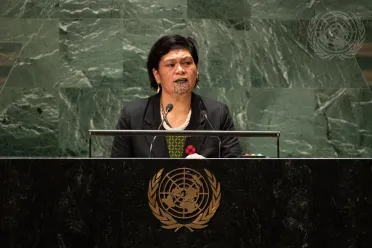Statement
Statement summary
NANAIA MAHUTA, Minister for Foreign Affairs of New Zealand, said that “no matter where or who we are from around the world, we are bound by a shared spirit of humanity”. World leaders are indeed meeting at a time of sharply increasing danger for people and the planet. “As we emerge from the worst health emergency in the past hundred years, our efforts to ‘build back better’ have faltered in the face of accelerating ecological and planetary crises, deepening conflict and instability,” she pointed out. Mounting distrust and division are eroding the foundation of international cooperation and steering the multilateral system towards deadlock and dysfunction. For the first time in several generations, the world faces the very real possibility of conflict between major powers. “The stakes for all of us are simply too high,” she warned. The international rule of law and the UN Charter must mean something to a growing generation that are becoming more sceptical.
The Russian Federation’s illegal invasion of Ukraine last year was a direct attack on the sovereignty and territorial integrity of a UN Member State, she continued. To witness a permanent member of the Security Council launch an unprovoked attack on a sovereign State, attempting to annex its territory and waging war on its civilian population was and remains shocking, she said. This war has also highlighted geostrategic tensions and heightened nuclear risks. Nuclear weapons must never be used. “The dangers of nuclear weapons and their toxic legacy — which are visible in our own blue Pacific region — have been with us for decades,” she said. Moreover, food insecurity is threatening the lives of hundreds of millions of people across the globe. Pervasive drought in the Horn of Africa, and instability and violence in the Sahel, Afghanistan, Syria and Myanmar has left millions in need of urgent humanitarian assistance. “Playing politics with innocent lives is cruel and immoral,” she stressed.
International financial institutions must evolve to better serve the demands of the current era, she emphasized, also underscoring that climate change is the greatest existential threat facing the planet. The countries of the Pacific are on the front lines and are already experiencing irreversible damage. Limiting warming to 1.5°C is vital to achieve the shared development goals. “Every increment of a degree and every ton of emissions matters,” she said. There is a narrow and rapidly closing window to secure a sustainable and liveable future for all. For its part, New Zealand is investing in Pacific resilience, mobilizing climate finance and supporting Pacific partners to respond to climate-driven events. Indigenous Peoples, businesses, financial institutions, local governments, youth, communities and individuals all have crucial roles to play, she said, spotlighting that “at home, we choose to embrace difference” as a source of strength for resolving challenges rather than as a wedge to divide. Addressing the General Assembly, she declared: "We must weave all our aspirations and our common and shared humanity together." Joined by the New Zealand delegation from their seats, she sang in Te reo Māori a song of hope and peace.
Full statement
Read the full statement, in PDF format.
Photo

Previous sessions
Access the statements from previous sessions.
